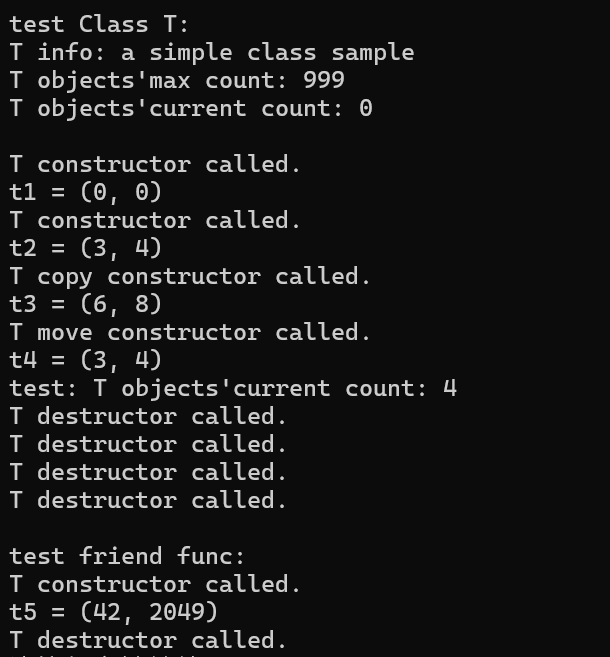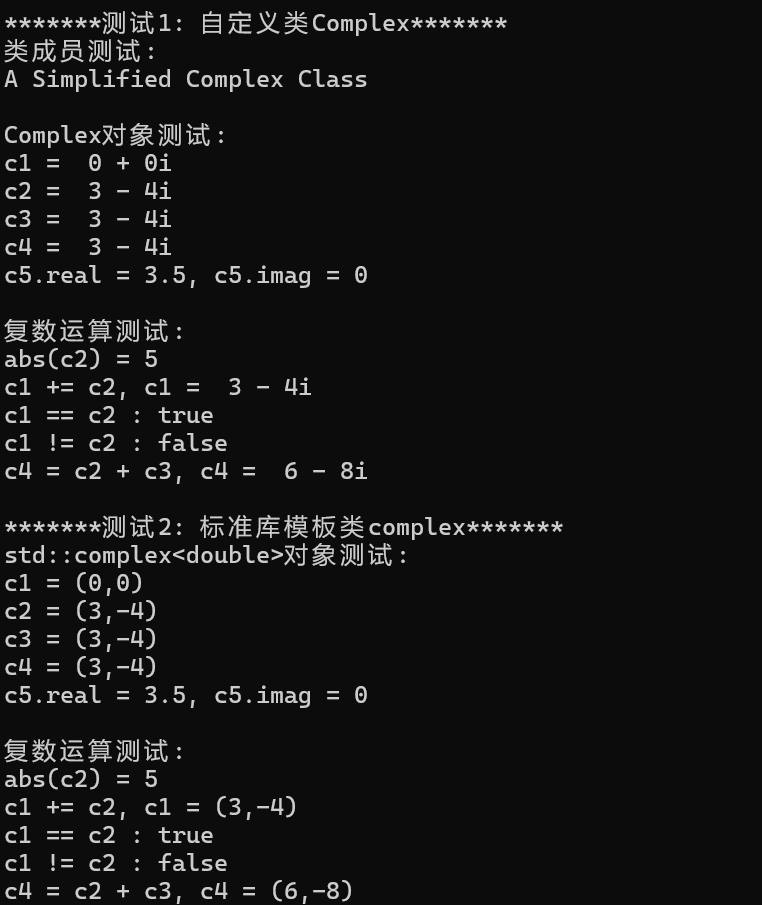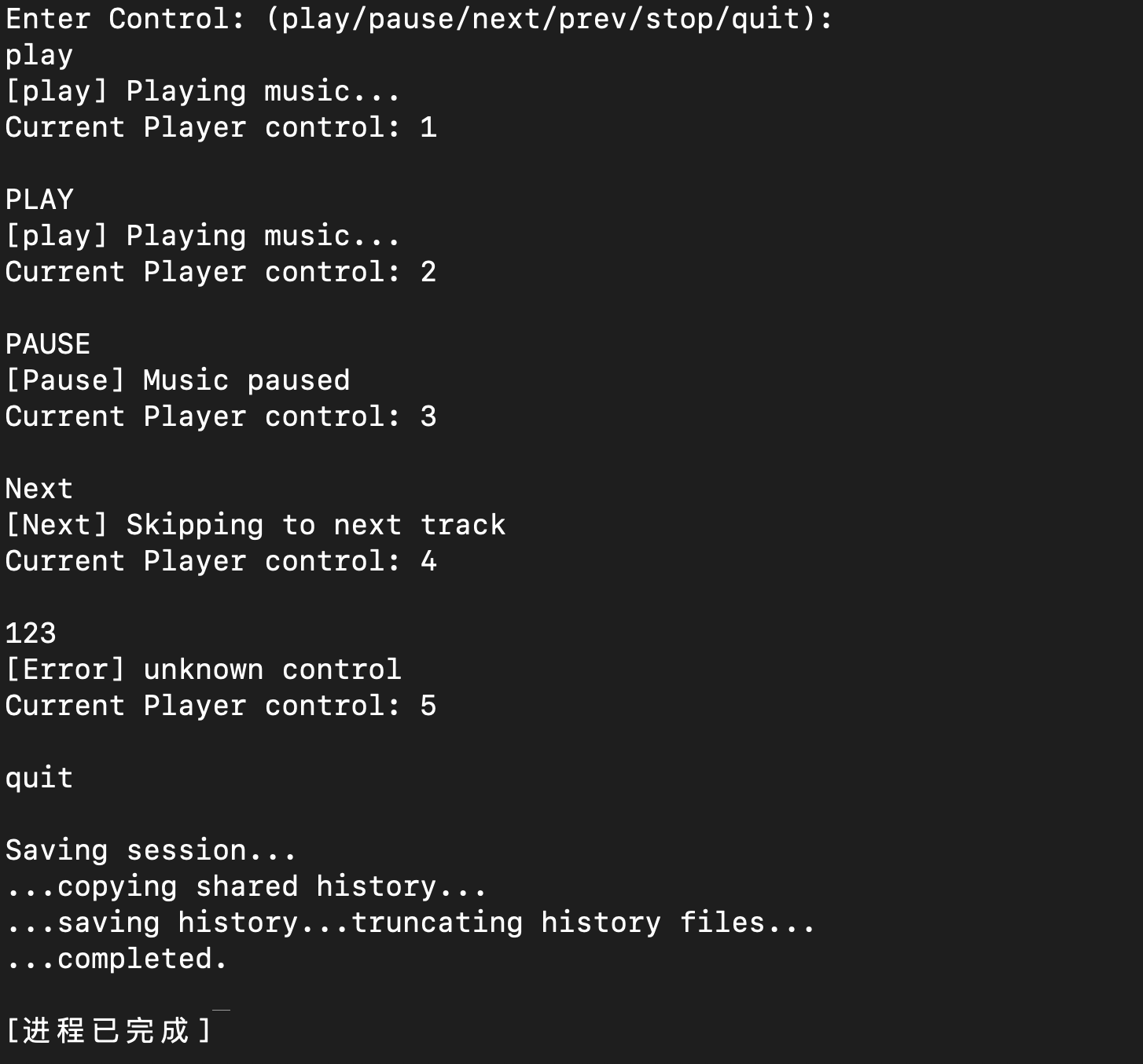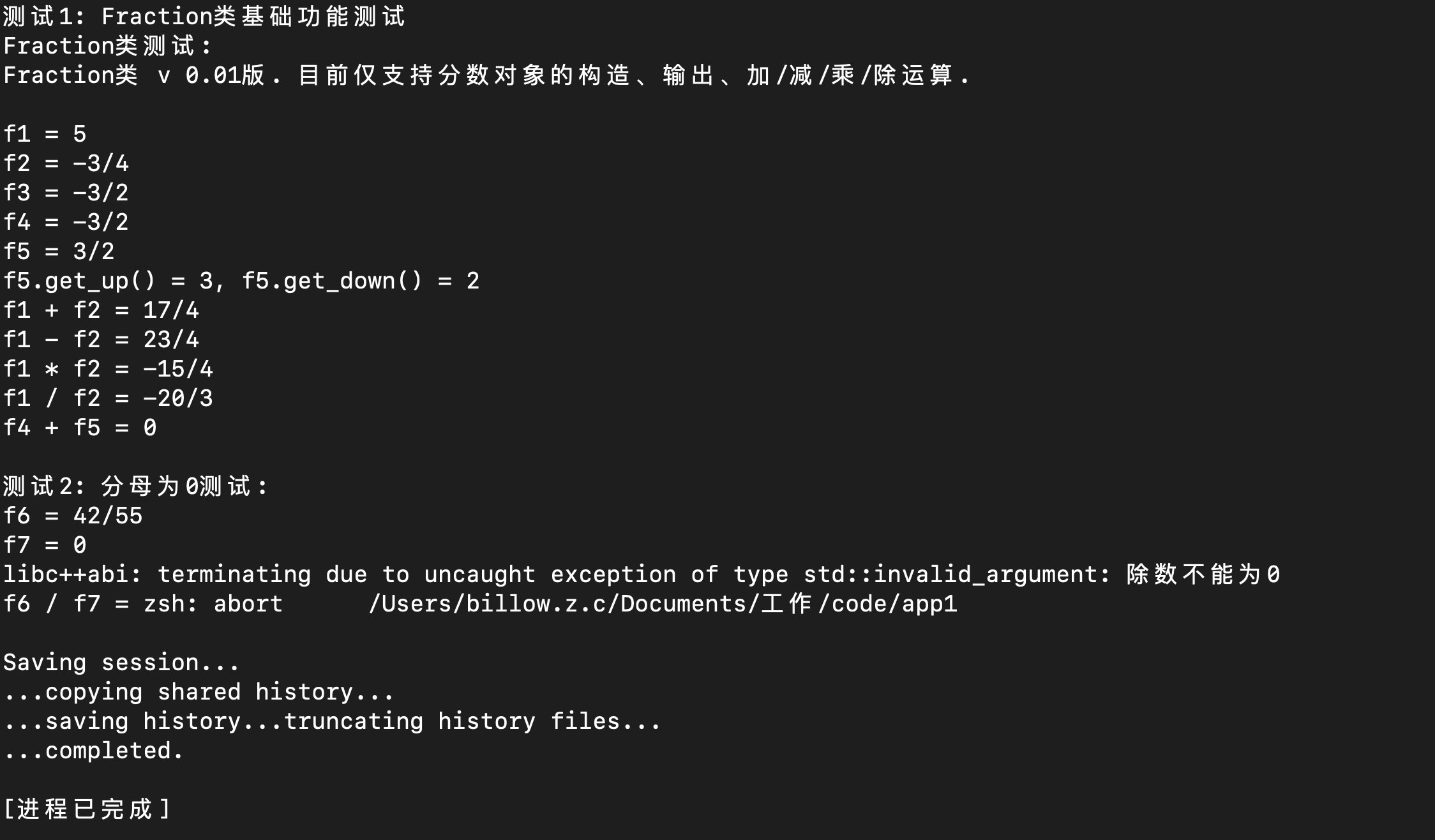实验二
实验一
源代码
T.cpp
#include "T.h"
#include <iostream>
#include <string>
// 类T实现
// static成员数据类外初始化
const std::string T::doc{"a simple class sample"};
const int T::max_cnt = 999;
int T::cnt = 0;
// 类方法
int T::get_cnt() {
return cnt;
}
// 对象方法
T::T(int x, int y): m1{x}, m2{y} {
++cnt;
std::cout << "T constructor called.\n";
}
T::T(const T &t): m1{t.m1}, m2{t.m2} {
++cnt;
std::cout << "T copy constructor called.\n";
}
T::T(T &&t): m1{t.m1}, m2{t.m2} {
++cnt;
std::cout << "T move constructor called.\n";
}
T::~T() {
--cnt;
std::cout << "T destructor called.\n";
}
void T::adjust(int ratio) {
m1 *= ratio;
m2 *= ratio;
}
void T::display() const {
std::cout << "(" << m1 << ", " << m2 << ")" ;
}
// 普通函数实现
void func() {
T t5(42);
t5.m2 = 2049;
std::cout << "t5 = "; t5.display(); std::cout << '\n';
}
T.h
#pragma once
#include <string>
// 类T: 声明
class T {
// 对象属性、方法
public:
T(int x = 0, int y = 0); // 普通构造函数
T(const T &t); // 复制构造函数
T(T &&t); // 移动构造函数
~T(); // 析构函数
void adjust(int ratio); // 按系数成倍调整数据
void display() const; // 以(m1, m2)形式显示T类对象信息
private:
int m1, m2;
// 类属性、方法
public:
static int get_cnt(); // 显示当前T类对象总数
public:
static const std::string doc; // 类T的描述信息
static const int max_cnt; // 类T对象上限
private:
static int cnt; // 当前T类对象数目
// 类T友元函数声明
friend void func();
};
// 普通函数声明
void func();
test1.cpp
#include "T.h"
#include <iostream>
void test_T();
int main() {
std::cout << "test Class T: \n";
test_T();
std::cout << "\ntest friend func: \n";
func();
system("pause");
}
void test_T() {
using std::cout;
using std::endl;
cout << "T info: " << T::doc << endl;
cout << "T objects'max count: " << T::max_cnt << endl;
cout << "T objects'current count: " << T::get_cnt() << endl << endl;
T t1;
cout << "t1 = "; t1.display(); cout << endl;
T t2(3, 4);
cout << "t2 = "; t2.display(); cout << endl;
T t3(t2);
t3.adjust(2);
cout << "t3 = "; t3.display(); cout << endl;
T t4(std::move(t2));
cout << "t4 = "; t4.display(); cout << endl;
cout << "test: T objects'current count: " << T::get_cnt() << endl;
}
运行截图

问题回答
- 报错,截图如下:
![image]()
意思是func函数没有在范围内声明。
窃以为,当我们删去Line36行的func定义时,类内部的友元就无法识别func已经声明过,从而编译出错,因此出现了报错的情况; -
- 普通构造函数在创建变量的时候调用,无论是创建空变量还是带有参数值的变量;
- 复制构造函数在创建变量的时候,但是传入的是该类的变量的时候使用
s1(s2),这样相当于把s2拷贝到了s1中; - 移动构造函数在进行
move操作的时候,负责将右值传递给新的变量; - 析构函数则在程序退出时自动销毁内存中的变量。
- 编译失败,截图如下:
![image]()
移动代码后,移动的函数在h中被定义两次,程序出现了重复定义,因此出错。
实验二
源代码
Complex.h
#pragma once
#include <iostream>
#include <string>
class Complex {
public:
static constexpr const char* doc = "A Simplified Complex Class";
Complex(): real_(0.0), imag_(0.0) {};
Complex(double real, double imag = 0.0): real_(real), imag_(imag) {};
Complex(const Complex& other) = default;
double get_real() const;
double get_imag() const;
void add(const Complex& other);
friend bool is_equal(const Complex& c1 , const Complex& c2);
friend bool is_not_equal(const Complex& c1 , const Complex& c2);
friend Complex add(const Complex& c1, const Complex& c2);
friend double abs(const Complex& c);
friend void output(const Complex& c);
private:
double real_;
double imag_;
};
Complex.cpp
#include "Complex.h"
#include <cmath>
#include <string>
#include <iostream>
#include <iomanip>
double Complex::get_real() const {
return real_;
}
double Complex::get_imag() const {
return imag_;
}
void Complex::add(const Complex& other) {
real_ += other.real_;
imag_ += other.imag_;
}
bool is_equal(const Complex& c1, const Complex& c2) {
return (c1.real_ == c2.real_) && (c1.imag_ == c2.imag_);
}
bool is_not_equal(const Complex& c1, const Complex& c2) {
return !is_equal(c1, c2);
}
Complex add(const Complex& c1, const Complex& c2){
return Complex(c1.real_ + c2.real_, c1.imag_ + c2.imag_);
}
double abs(const Complex& c) {
return std::sqrt(c.real_ * c.real_ + c.imag_ * c.imag_);
}
void output(const Complex& c){
if (c.imag_ >= 0)
{
std::cout << std::setw(2) << c.real_ << " + " << c.imag_ << "i";
}
else
{
std::cout << std::setw(2) << c.real_ << " - " << -c.imag_ << "i";
}
}
test2.cpp
// 待补足头文件
#include "Complex.h"
#include <iostream>
#include <iomanip>
#include <complex>
void test_Complex();
void test_std_complex();
int main() {
std::cout << "*******测试1: 自定义类Complex*******\n";
test_Complex();
std::cout << "\n*******测试2: 标准库模板类complex*******\n";
test_std_complex();
system("pause");
}
void test_Complex() {
using std::cout;
using std::endl;
using std::boolalpha;
cout << "类成员测试: " << endl;
cout << Complex::doc << endl << endl;
cout << "Complex对象测试: " << endl;
Complex c1;
Complex c2(3, -4);
Complex c3(c2);
Complex c4 = c2;
const Complex c5(3.5);
cout << "c1 = "; output(c1); cout << endl;
cout << "c2 = "; output(c2); cout << endl;
cout << "c3 = "; output(c3); cout << endl;
cout << "c4 = "; output(c4); cout << endl;
cout << "c5.real = " << c5.get_real()
<< ", c5.imag = " << c5.get_imag() << endl << endl;
cout << "复数运算测试: " << endl;
cout << "abs(c2) = " << abs(c2) << endl;
c1.add(c2);
cout << "c1 += c2, c1 = "; output(c1); cout << endl;
cout << boolalpha;
cout << "c1 == c2 : " << is_equal(c1, c2) << endl;
cout << "c1 != c2 : " << is_not_equal(c1, c2) << endl;
c4 = add(c2, c3);
cout << "c4 = c2 + c3, c4 = "; output(c4); cout << endl;
}
void test_std_complex() {
using std::cout;
using std::endl;
using std::boolalpha;
cout << "std::complex<double>对象测试: " << endl;
std::complex<double> c1;
std::complex<double> c2(3, -4);
std::complex<double> c3(c2);
std::complex<double> c4 = c2;
const std::complex<double> c5(3.5);
cout << "c1 = " << c1 << endl;
cout << "c2 = " << c2 << endl;
cout << "c3 = " << c3 << endl;
cout << "c4 = " << c4 << endl;
cout << "c5.real = " << c5.real()
<< ", c5.imag = " << c5.imag() << endl << endl;
cout << "复数运算测试: " << endl;
cout << "abs(c2) = " << abs(c2) << endl;
c1 += c2;
cout << "c1 += c2, c1 = " << c1 << endl;
cout << boolalpha;
cout << "c1 == c2 : " << (c1 == c2)<< endl;
cout << "c1 != c2 : " << (c1 != c2) << endl;
c4 = c2 + c3;
cout << "c4 = c2 + c3, c4 = " << c4 << endl;
}
运行截图

问题回答
- 单看stl和custom版本的complex类,个人感觉其实stl更加的简洁,它不需要你调用函数,而是和一个C++“本来就有的”数据结构一样去调用它(至少,你写add肯定比“+”要更加繁琐)至于函数与运算的内在关联,我感觉运算更加简洁,它存在于一套编程语言的底层,比函数层级更基础。运算符是构成函数的基础之一,而函数又可以通过基础运算符实现更加复杂的运算,两者相互依存,不可分割。
- 是的,因为涉及运算和显示确实需要访问实部和虚部;通过函数进行访问并完成一样的操作显然过于复杂;
- 不是,在complex中有相关接口,不需要。
- 在迫不得已需要直接访问私有成员的时候可以考虑使用friend,一般情况下还是最好是公共类型提供接口;
- 直接禁用复制构造函数可以禁用“=”,但是显然脱离题意,这样的话复制操作完全被禁用了。还有一种办法
MyClass& operator=(const MyClass&) = delete;这样的话直接禁用了“=”操作符。
实验三
源代码
PlayerControl.cpp
#include "PlayerControl.h"
#include <iostream>
#include <algorithm>
int PlayerControl::total_cnt = 0;
PlayerControl::PlayerControl() {}
// 待补足
// 1. 将输入字符串转为小写,实现大小写不敏感
// 2. 匹配"play"/"pause"/"next"/"prev"/"stop"并返回对应枚举
// 3. 未匹配的字符串返回ControlType::Unknown
// 4. 每次成功调用parse时递增total_cnt
ControlType PlayerControl::parse(const std::string& control_str) {
std::string res(control_str);
std::transform(control_str.begin(),control_str.end(),res.begin(),[](char c){return std::tolower(c);});
if (res == "play")
{
total_cnt++;
return ControlType::Play;
}
else if (res == "pause")
{
total_cnt++;
return ControlType::Pause;
}
else if (res == "next")
{
total_cnt++;
return ControlType::Next;
}
else if (res == "prev")
{
total_cnt++;
return ControlType::Prev;
}
else if (res == "stop")
{
total_cnt++;
return ControlType::Stop;
}
else
{
total_cnt++;
return ControlType::Unknown;
}
}
void PlayerControl::execute(ControlType cmd) const {
switch (cmd) {
case ControlType::Play: std::cout << "[play] Playing music...\n"; break;
case ControlType::Pause: std::cout << "[Pause] Music paused\n"; break;
case ControlType::Next: std::cout << "[Next] Skipping to next track\n"; break;
case ControlType::Prev: std::cout << "[Prev] Back to previous track\n"; break;
case ControlType::Stop: std::cout << "[Stop] Music stopped\n"; break;
default: std::cout << "[Error] unknown control\n"; break;
}
}
int PlayerControl::get_cnt() {
return total_cnt;
}
PlayerControl.h
#pragma once
#include <string>
enum class ControlType {Play, Pause, Next, Prev, Stop, Unknown};
class PlayerControl {
public:
PlayerControl();
ControlType parse(const std::string& control_str); // 实现std::string --> ControlType转换
void execute(ControlType cmd) const; // 执行控制操作(以打印输出模拟)
static int get_cnt();
private:
static int total_cnt;
};
test3.cpp
#include "PlayerControl.h"
#include <iostream>
void test() {
PlayerControl controller;
std::string control_str;
std::cout << "Enter Control: (play/pause/next/prev/stop/quit):\n";
while(std::cin >> control_str) {
if(control_str == "quit")
break;
ControlType cmd = controller.parse(control_str);
controller.execute(cmd);
std::cout << "Current Player control: " << PlayerControl::get_cnt() << "\n\n";
}
}
int main() {
test();
}
编译命令(额外附加)
clang++ task3.cpp PlayerControl.cpp -o app -std=c++11
运行截图

问题回答
- 额,其实修改一下编码就可以了,把编码修改成utf-8,然后直接在打印界面,找个emoji贴上去就可以了,由于本项目是基于GBK的编码格式,一定要提前转码!
实验四
源代码
Fraction.cpp
#include "Fraction.h"
#include<iostream>
const std::string Fraction::doc{"Fraction类 v 0.01版. 目前仅支持分数对象的构造、输出、加/减/乘/除运算."};
int Fraction::gcd(int a, int b) const{
a = std::abs(a);
b = std::abs(b);
while (b != 0)
{
int temp = b;
b = a % b;
a = temp;
}
return a;
}
int Fraction::get_up()const{
return up;
}
int Fraction::get_down()const{
return down;
}
Fraction Fraction::negative()const{
return Fraction(-up , down);
}
Fraction add(const Fraction& f1 , const Fraction& f2){
Fraction sum((f1.up*f2.down+f1.down*f2.up),(f1.down*f2.down));
return sum;
}
Fraction sub(const Fraction& f1 , const Fraction& f2){
return add(f1,f2.negative());
}
void output(const Fraction& f) {
if (f.up == 0) {
std::cout << 0;
} else if (f.down == 1) {
std::cout << f.up;
} else {
std::cout << f.up << "/" << f.down;
}
}
Fraction mul(const Fraction& f1, const Fraction& f2) {
int newUp = f1.up * f2.up;
int newDown = f1.down * f2.down;
return Fraction(newUp, newDown);
}
Fraction div(const Fraction& f1, const Fraction& f2) {
if (f2.up == 0 || f2.down == 0) {
throw std::invalid_argument("除数不能为0");
}
int newUp = f1.up * f2.down;
int newDown = f1.down * f2.up;
return Fraction(newUp, newDown);
}
Fraction.h
#pragma once
#include<iostream>
#include<stdexcept>
#include<string>
class Fraction
{
private:
int up;
int down;
int gcd(int a, int b) const;
public:
static const std::string doc;
Fraction()=delete;
Fraction(int i_up,int i_down=1):up{i_up},down{i_down}{
if (down < 0)
{
down = -down;
up = -up;
}
if (down == 0)
{
throw std::invalid_argument("分母不能为0");
}
int commonDivisor = gcd(up, down);
up /= commonDivisor;
down /= commonDivisor;
};
Fraction(const Fraction& others)=default;
int get_up()const;
int get_down()const;
Fraction negative()const;
friend void output(const Fraction& f);
friend Fraction add(const Fraction& f1 , const Fraction& f2);
friend Fraction sub(const Fraction& f1 , const Fraction& f2);
friend Fraction mul(const Fraction& f1 , const Fraction& f2);
friend Fraction div(const Fraction& f1 , const Fraction& f2);
};
运行截图

问题回答
友元,相对方便且易于管理
实验总结
- 本次实验做的还是比较头大的qwq,第一个是方法的编写上还是保留了函数的固有思维,一直在头疼于找参数,其实直接用private就可以了;还有就是doc的初始化,非常坐牢qwq,编译器一直报错,一直分不清static和const在哪里写;
- 有点收获:前两个实验是机房做的,用的编译器是g++;后两个是在图书馆用我的备用机macbook air(x86框架)做的,用的是clang++编译器,我也算都了解了一下如何用powershell和terminal编译(),还有就是感觉要好好恶补一下英语,报错信息看不懂()






 浙公网安备 33010602011771号
浙公网安备 33010602011771号